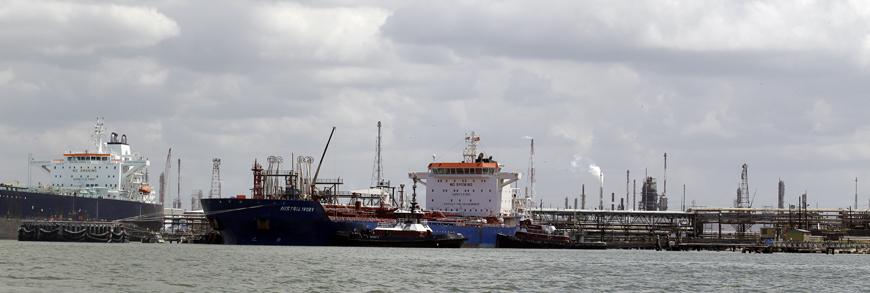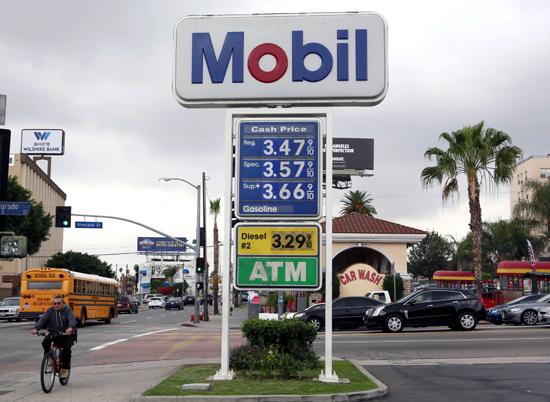You are here
Oil profits plunge as industry eyes a bottom
By AFP - Apr 30,2016 - Last updated at Apr 30,2016

In this June 28, 2011 file photo, an oil tanker is docked at the ExxonMobil Baytown complex along the Houston Ship Channel in Baytown, Texas (AP photo)
NEW YORK — Plunging oil prices battered oil giants' profits in the first quarter, another blow following credit downgrades, lay-offs and drilling cutbacks in the wake of a long rout.
Chevron on Friday became the latest big oil company to land in the red due to low commodity prices, reporting a loss of $725 million in the quarter ending March 31.
The second biggest US oil company pledged more belt-tightening after trimming capital spending nearly 25 per cent in the first quarter from the year-ago period, said Chevron Chief Executive John Watson.
"We continue to lower our cost structure with better pricing, work flow efficiencies and matching our organisational size to expected future activity levels," Watson said.
ExxonMobil, which was downgraded from the highest triple A credit rating earlier this week, managed to stay in the black with $1.8 billion in profits.
But profit at the biggest oil company was 63 per cent lower than in the year-ago period and included a loss of $76 million in its normally lucrative exploration and production business.
Both BP and ConocoPhillips reported losses earlier in the week.
The results reflect the effects of a nearly 40 per cent drop in oil prices to under $30 a barrel for much of the first quarter amid a persistent global oversupply.
Oil prices have since risen back to around $45 a barrel, raising hopes that the first quarter could be a low point.
"This quarter is probably going to be the trough in their earnings profiles," said Nate Thooft, a senior managing director at John Hancock Asset Management.
"Later in the year, assuming oil stays at this level, or at least stays somewhat stable, this will probably be the worst quarter for energy earnings we'll see."
While results in exploration and production were particularly ugly, profits in the refining business were also bad. Chevron saw a nearly 50 per cent decline in earnings from this area to $735 million.
Cheaper oil prices usually boost refining profits because crude is a feedstock for making gasoline. But that effect was blunted in the first quarter due to weak demand for some petroleum products, such as heating oil, because of the unseasonally warm winter.
ExxonMobil also suffered a big hit to its refining profits, but got a boost from $373 million rise in chemical earnings to $1.4 billion. Chevron does not have a chemical business.
ExxonMobil shares were up 0.4 per cent to $88.40 in morning trade, while Chevron fell 1.3 per cent to $101.03.
Losing streak
Friday's weak earnings came on the heels of other poor results earlier in the week from other large oil companies. ConocoPhillips reported a loss of $1.5 billion, while British giant BP lost $583 million.
Both of those companies took a cautious stance on the recent rise in oil prices.
ConocoPhillips, which announced Thursday it was slashing its 2016 capital budget for a second time, said it would devote gains from higher oil prices to debt reduction before boosting its drilling budget.
"We are not in a hurry to say there is some price trigger where we are going to add back capital," said Al Hirshberg, the executive vice president for production, drilling and projects.
"We will be looking at the entire macroenvironment, looking at supply and demand fundamentals and whether we think that any price action that we get is actually sustainable or not."
BP Chief Financial Officer Brian Gilvary said the company expects "a modestly more favourable oil price environment in 2017 than we see today" and suggested the second half of 2016 could also see some gains from today's levels.
The reticence stems from the fact that oil inventories remain at lofty levels. A major summit of producers earlier last month in Qatar reflected the concern about low prices of Saudi Arabia, Russia and others, but still fell short of an agreement to limit output.
"I don't think oil prices are going to be materially higher from here," said Thooft. "We haven't really solved the supply issue."
Related Articles
NEW YORK — ExxonMobil and Chevron reported soaring profit on Friday despite lower oil and natural gas volumes as the petroleum giants return
NEW YORK — US oil giants Chevron and ExxonMobil have signalled further belt-tightening ahead as the industry responds to lower oil prices th
NEW YORK — Rising crude prices drove huge profits for US oil industry giants, but key figures in the sector have raised concerns about low i


















